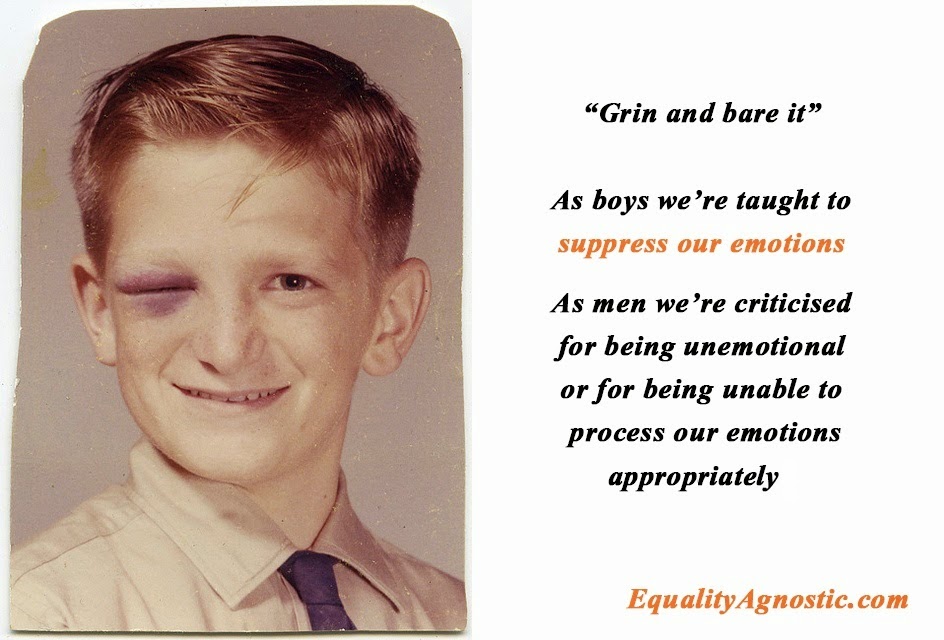I wish I knew what it was like to be a normal, emotional, human being. But I don’t.
Instead I was raised to overcome my nature, to be the poster child for the male gender-role, to protectand provide.
If you look at the backs of my hands, particularly on the knuckles of my right hand, you will see a series of hairline white scars. They are the fading reminders of where my fists connected with people’s teeth instead of their jaw. My nose is a little off centre from taking one too many hits. I have a hairline scar in my right brow where it was split open by the impact of a man’s ring. Most notably, I have a fading scar now covered by my beard when my lower front teeth were smashed through my lower lip and became lodged in the top of another boy’s skull (while still stuck through my lip). I also once bit through the centre of my tongue from an uppercut that caught me at just the right (wrong?) moment.
But I walked away from all of it with a smile, because that is what’s expected of my gender…
Be a man! Which really means:
Don’t acknowledge your pain.
Don’t acknowledge your feelings.
Don’t be a normal human being.
I learned to suppress my emotions and now as an adult rarely know how to process them. Worst of all, I know that I didn’t start this way; I know this isn’t my nature.
By nature, I am not silent.
I like to talk about my feelings and I love to hear about other people’s feelings. I consider there to be no greater honour than for someone to share with me anything that is weighing on their mind, to trust me enough to let me in.
By nature I am not ‘tough’ or emotionless.
I cry for every father-son scene in any TV show or movie and I completely fall to pieces for anything where a child is hurt or bullied.
By nature I am effeminate.
While I don’t care much for any other special occasion, Valentine’s Day and anniversaries at my house are an extravaganza, romance means something to me—I try as often as possible to leave little notes and surprises for my amazing other half to remind her how much I love her.
But my gender-role upbringing and environment taught that to be a protector, to be ‘a real man’, I must overcome my nature. It taught me that there is no boy’s club, no brotherhood; it taught me that a violent confrontation with a man is not an if, it is a when. I view men at all times as potential enemies first and potential allies second—and there are plenty of people just like me. It taught me that if I want the people I love to be safe, to feel safe, if I want to be ‘a good man’, I must suppress my feelings, I must prepare for violence, I must invite it when it presents itself, I must endure it when it occurs and when I have done those things—I meet the criteria of being ‘a good man’.
But I’m so tired of being a good man.
I’d like to be allowed to just be a good person.


My husband is the epitome of masculine. He was a car mechanic when I met him and played in a armature adult hockey league. He became a self-taught handy man when we bought our first house, and then changed careers to long-haul trucking. However, as our two young daughters grow, he thinks nothing of playing with baby dolls and ponies. Once, one of single friends made fun of him about this playing. The teasing didn't bother him at all, but it bothered me. My husband is a good-hearted person who is an amazing father, how does being a good father make him the butt of a joke?
Hi Lisa, Thank you so much for your comment 🙂 I've seen this kind of thing many times, it is confounding isn't it? There is an unconscious belief shared by most people raised with a strict "protector" gender role that you cannot be a nurturer as well as a protector, that the skill set required to be able to love and and care for a life is at odds with the potential requirement to take a life in defense of your family, or to sacrifice your own. The outcome is generation after generation of humans who have learned to verbally or physically attack the nurturer aspect of anyone they feel is meant to be a protector, so that only the protector mindset remains. It's an ugly norm and until we relieve both genders of the need to adhere to gender role, it is unfortunately a norm that will not change.